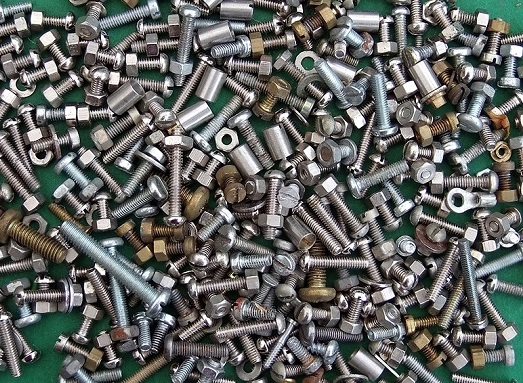Guide to Fixings and Fasteners
Reading time: 8 minutes
These building accessories are essential, but sometimes these small elements are overlooked when planning projects. With that in mind, we’re going to unpack the literal nuts, bolts and more to explain the different kinds of fasteners and how they’re used.
Types of temporary and threaded fasteners
Threaded fasteners are usually made to hold things together that may need dismantling, replacing or adjusting at some point. While there are lots of variations of threaded fasteners, they come in three different categories: screws, bolts and nuts. Each of these categories have their variations too, as you might expect. Let’s take a closer look at these in more detail.
Types of screw heads and threads
One of the clearest ways to tell screws apart, except for their size, is the indentation on the screw head. You’ll probably come across three different types of heads: slotted, Phillips/cross head and Allen/hex key.
Why are there different types of screw heads?
The indents of screws are known as drives, which are designed for use with different screwdrivers. Slot head screws are mainly for use with flat head, hand-held screwdrivers. Philips headed screws are more for use with the torque of powered screwdrivers, while holding the screwdriver in place at higher speeds. This can be tougher with slotted screws as they’re more likely to slip.
Screws that require an Allen, or hex key, are often used for fastening metal or wooden parts together in awkward places. Allen keys are designed to get into difficult corners, which makes tightening these types of screws easier.
Another screw head you may come across is the pozi type. Pozi screws are similar to Phillips head screws, but with extra notches that help with even more stability.
Types of screws and screw threads
Screws can be fitted into different materials, bolts, rawl plugs and other accessories. Therefore, certain jobs require screws with specific threads, allowing for better application to meet these needs. The following screws are perhaps the most common that you’ll find in the UK:
- Self-Tapping Screws
- Countersunk Screws
- Machine Screws
- Wood Screws
- Masonry Screws
- Sheet Metal Screws
Types of bolts
Bolts are threaded fasteners that work by being coupled with a nut to fix in place. This method of fastening is used in lots of different applications from small domestic projects to major construction.
- Hexagon Bolts
- Lifting Eye Bolts
- Folded Eye Bolts
- U-Bolts
- J-Bolts
- Carriage Bolts
Types of nuts and washers
Bolts aren’t much use without a nut for secure fastening, but that’s only part of the story. Sometimes washers are also needed, each having their own uses.
- Cap Nuts
- Coupling Nuts
- Flange Serrated Nuts
- Castle Nuts
- Lock Washers
- Spring Washers
- C-Washers
Permanent fasteners
Unlike with screws, nuts and bolts, which can be loosened, adjusted or replaced, more permanent fastenings like nails can be used. That’s not to say they’re impossible to be removed, but they work in a way that’s often a faster and very secure fitting.
- Round Wire Nails
- Masonry nails
- Turbo Zip Nails
- Clasp Nails
- Oval Wire Nails
- Lost Head Nails
- Plasterboard Nails
- Felt Nails
- Square Twist Nails
- Annular Nails
Pins, rivets and other fasteners
There are many other types of fixings and fasteners, so you’ll always find variations on the ones listed below. Here are perhaps the most common ones you’ll see in any construction or DIY job.
- Pins and Tacks
- Rivets
- Brads
- Staples
If you’ve found this guide to fasteners useful, we have more help with construction and home maintenance advice available at Trade Corner.
Disclaimer: The information contained on this page is intended as an overall introduction and is not intended as specific advice from a qualified professional. Travis Perkins aims to avoid, but accepts no liability, in the case that any information stated is out of date.











